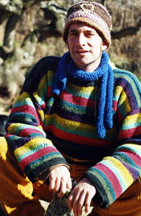 I recently had the chance to conduct an email interview with Sandor Katz, author of the book Wild Fermentation: The Flavor, Nutrition, and Craft of Live-Culture Foods. The book is an excellent, fun, and straightforward look at fermentation, and an especially handy DIY tome for those so inclined. I'll admit to being a bit intimidated by the idea of fermenting my own foods (although I do love to eat sauerkraut, kimchi, miso, yogurts, and lots of other things in the book), but I thoroughly enjoyed the book. It's written in Katz' easy going style (the guy goes by the nickname "Sandorkraut," which says a lot about him), and is an approachable, easy read. Here's the interview:
I recently had the chance to conduct an email interview with Sandor Katz, author of the book Wild Fermentation: The Flavor, Nutrition, and Craft of Live-Culture Foods. The book is an excellent, fun, and straightforward look at fermentation, and an especially handy DIY tome for those so inclined. I'll admit to being a bit intimidated by the idea of fermenting my own foods (although I do love to eat sauerkraut, kimchi, miso, yogurts, and lots of other things in the book), but I thoroughly enjoyed the book. It's written in Katz' easy going style (the guy goes by the nickname "Sandorkraut," which says a lot about him), and is an approachable, easy read. Here's the interview:
Lee In your book, you say “when I try to conjure the origin of my fascination with this natural phenomenon [fermentation], it leads me to my taste buds,” but I’m not sure I get it. Why fermentation? Why not open a Kosher deli instead?
Sandor: I’ve always loved exploring how foods are prepared. Before I even started thinking about fermentation, I had baked lots of bread and had learned the basics of turning milk into cheese. My interest in fermentation began with my taste buds in the sense that I have always loved the sour flavors of lacto-fermentation. I have bought foods with these flavors from delis, but that’s altogether different from my desire to understand the process of creating them. As I have learned different fermentation processes and become active sharing them with other people, I have come to understand that these microbial processes are integral to most of our favorite foods. But unfortunately, like most aspects of food production, we have allowed fermentation to disappear behind factory doors. As a result, many people have come to fear fermentation, believing that ferments our ancestors have practiced forever are dangerous or difficult. Reclaiming fermentation is an important part of reclaiming food.
Lee: Do I need to be a chemist - or even interested in food chemistry - in order to experiment with fermentation? It seems kind of complicated.
Sandor: Absolutely not. These are ancient rituals that people have been practicing for millennia without the ability to identify microorganisms, without sterile conditions, without the ability to control temperature. Many ferments are simple to prepare at home without any special equipment whatsoever.
Lee: What’s an easy way to get started? What supplies do I need to buy?
Sandor: I think sauerkraut or kimchi, fermented shredded vegetables, is the easiest place to start. All you need are vegetables, salt, a cutting board, knife, and jar. Come to one of the workshops to learn how, or check out my book
Wild Fermentation or my website
www.wildfermentation.com, which has recipes posted.
 I recently had the chance to conduct an email interview with Sandor Katz, author of the book Wild Fermentation: The Flavor, Nutrition, and Craft of Live-Culture Foods. The book is an excellent, fun, and straightforward look at fermentation, and an especially handy DIY tome for those so inclined. I'll admit to being a bit intimidated by the idea of fermenting my own foods (although I do love to eat sauerkraut, kimchi, miso, yogurts, and lots of other things in the book), but I thoroughly enjoyed the book. It's written in Katz' easy going style (the guy goes by the nickname "Sandorkraut," which says a lot about him), and is an approachable, easy read. Here's the interview:
I recently had the chance to conduct an email interview with Sandor Katz, author of the book Wild Fermentation: The Flavor, Nutrition, and Craft of Live-Culture Foods. The book is an excellent, fun, and straightforward look at fermentation, and an especially handy DIY tome for those so inclined. I'll admit to being a bit intimidated by the idea of fermenting my own foods (although I do love to eat sauerkraut, kimchi, miso, yogurts, and lots of other things in the book), but I thoroughly enjoyed the book. It's written in Katz' easy going style (the guy goes by the nickname "Sandorkraut," which says a lot about him), and is an approachable, easy read. Here's the interview:


